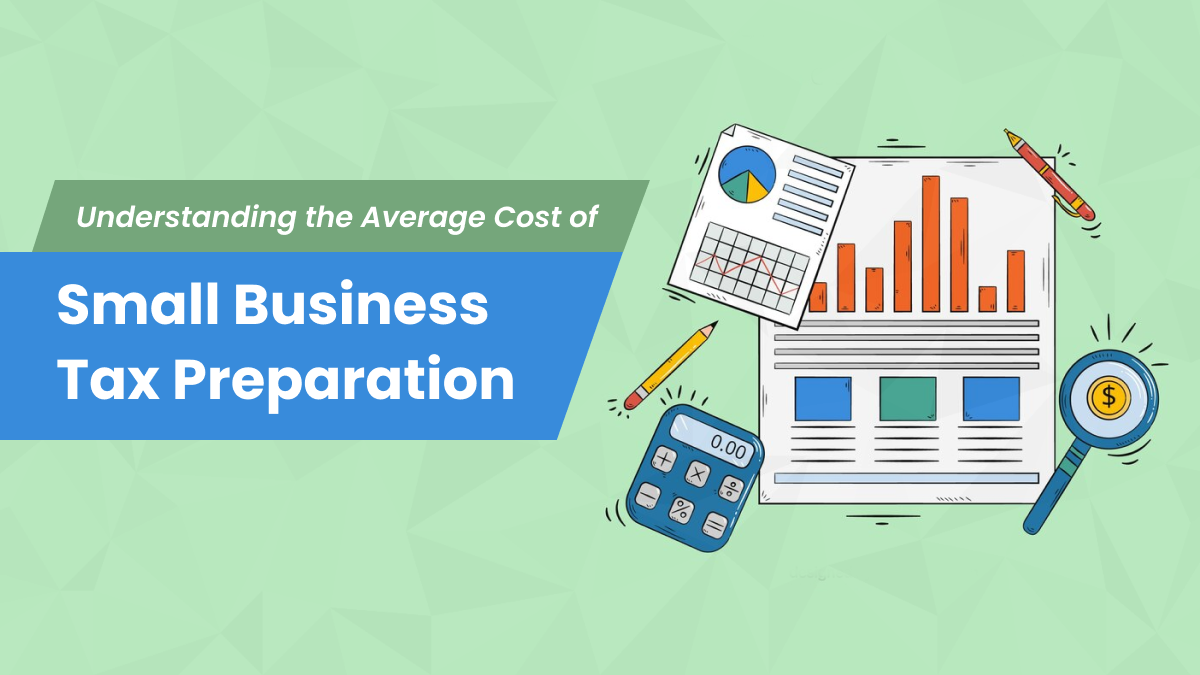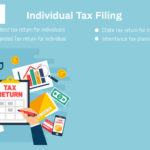Tax season poses a significant challenge for small business owners, adding complexity to the already intricate task of tax preparation. The paramount goal for entrepreneurs during this period is not only compliance with tax regulations but also the strategic optimization of their financial standing. In the pursuit of financial efficiency and legal adherence, understanding the costs associated with tax preparation is crucial.
The expenses incurred during this process can vary widely based on factors such as the level of professional expertise sought, the intricacy of the business’s financial records, geographical location, and the overall complexity of the tax situation. Navigating these considerations empowers small business owners to make informed decisions and effectively manage their tax-related expenditures.
How Much Does It Cost to Get Your Taxes Done?
Typically, the average cost of small business tax preparation typically varies based on factors such as the complexity of the business’s financial situation, geographical location, and the chosen tax professional, ranging from a few hundred to several thousand dollars., encompassing a standard 1040 and state return without itemized deductions, hovers around $220. However, it’s crucial not to hastily rely on this figure. The reality is that tax preparation expenses can fluctuate substantially, ranging from $300 to $600 or even more. This variance is contingent upon the complexity of your tax situation, your geographical location, and the pricing methodology employed by your tax professional. The intricacies of your financial records, the need for specialized deductions, and regional living costs can all contribute to the final cost. Therefore, small business owners should approach tax preparation costs with a nuanced understanding, recognizing the dynamic factors at play and making informed decisions based on their specific circumstances.
How qualified do you want your professional to be?
The first factor influencing the cost of tax preparation for small businesses is the level of expertise and qualification of the tax professional. Entrepreneurs can choose between various options, ranging from DIY software to hiring Certified Public Accountants (CPAs). While DIY software may seem cost-effective, it often lacks the precision and personalized advice that a qualified professional can provide.
For small businesses seeking a high level of expertise, hiring a CPA is a common choice. The average cost of tax preparation by CPA for small business tends to be higher due to their extensive training, experience, and in-depth knowledge of tax regulations. CPAs can offer valuable insights, helping businesses navigate complex tax codes and maximize their deductions.
How organized are your taxes?
The organization of your financial records plays a crucial role in determining the cost of tax preparation. If your business maintains accurate and well-organized financial records throughout the year, the tax preparation process will likely be more straightforward and less time-consuming. On the other hand, disorganized or incomplete records may require additional effort from tax professionals, resulting in higher costs.
Small business owners can minimize costs by implementing efficient record-keeping practices and maintaining a clear understanding of their financial transactions. This proactive approach not only reduces the time spent on tax preparation but also ensures accurate and compliant reporting.
Where do you live?
Geographical location is another significant factor influencing the average cost of tax preparation for small business. Tax regulations and living costs vary across regions, impacting the rates charged by tax professionals. Urban areas with higher living costs and a greater demand for professional services generally experience higher tax preparation fees.
Small business owners need to research the average cost of tax preparation in their specific location and consider whether the benefits of hiring a local professional outweigh the potential savings of outsourcing to a remote service. Local tax advisors may have a better understanding of regional tax nuances and can provide more personalized assistance.
How complicated are your taxes?
The complexity of your business’s tax situation is a key determinant of the overall cost of tax preparation. Small businesses with straightforward financial structures and minimal transactions may find that their tax preparation costs are relatively low. However, as the complexity increases—due to factors such as multiple revenue streams, international transactions, or intricate deductions—the cost of professional tax services tends to rise.
Tax professionals may charge higher fees for businesses with complex tax situations, reflecting the additional time and expertise required to ensure accurate and compliant filings. Small business owners should assess the complexity of their tax situation and choose a tax advisor whose skill set aligns with their specific needs.
How Do Tax Advisors Set Their Prices?
They charge a set fee for each tax form or schedule.
Some tax advisors charge a fixed fee for each tax form or schedule required for the business. This transparent pricing model allows small business owners to estimate their costs based on the number and complexity of the forms needed. However, it may not account for unforeseen complications that could arise during the tax preparation process.
They charge a fee that matches what you paid the year before.
Another pricing strategy involves setting fees based on the previous year’s costs. This approach assumes that the complexity of tax situations remains relatively consistent from year to year. While it provides predictability, it may not accurately reflect changes in the business’s financial structure or the evolving nature of tax regulations.
They charge a minimum fee, plus more if your taxes are complicated.
Many tax advisors implement a minimum fee structure, ensuring that even businesses with relatively simple tax situations contribute a baseline amount. Additional fees may be applied if complications arise during the tax preparation process. This model allows tax professionals to account for the potential complexities of each case while providing a basic level of service to all clients.
They charge a value-based fee—a price based on feeling.
Value-based pricing involves assessing the perceived value of the tax advisor’s services and charging accordingly. This approach considers factors such as the advisor’s reputation, the level of expertise provided, and the potential financial benefits to the client. While subjective, value-based pricing aims to align the cost of services with the value they deliver.
They charge an hourly rate.
Hourly billing is a straightforward pricing method where tax professionals charge clients based on the time spent working on their tax preparation. This model is transparent, but clients may be concerned about potential inefficiencies or unnecessary delays. To address these concerns, tax professionals often provide estimates of the total hours required for the job.
Where Can You Find a Trustworthy Tax Advisor?
Finding a trustworthy tax advisor is crucial for small businesses seeking reliable and accurate tax preparation services. Several avenues can help identify reputable tax professionals:
- Recommendations: Seek recommendations from fellow business owners, colleagues, or industry associations. Personal experiences can provide valuable insights into the reliability and competence of tax advisors.
- Online Reviews: Utilize online platforms to read reviews and testimonials from clients who have worked with tax professionals. Platforms like Yelp, Google Reviews, and industry-specific forums can offer a comprehensive overview of a tax advisor’s reputation.
- Professional Associations: Look for tax advisors who are members of recognized professional associations, such as the American Institute of CPAs (AICPA) or the National Association of Enrolled Agents (NAEA). Membership in these organizations often indicates a commitment to high ethical standards and ongoing professional development.
- Credentials: Verify the credentials of potential tax advisors, especially if considering a CPA. CPAs are required to meet specific education and experience requirements, pass a rigorous exam, and adhere to a strict code of professional conduct.
- Initial Consultations: Schedule initial consultations with potential tax advisors to discuss your business’s needs and assess their qualifications. Use this opportunity to ask about their experience, pricing structure, and approach to handling complex tax situations.
Conclusion
As small business owners navigate the intricacies of tax preparation, understanding the average cost of tax preparation for LLCs and other entities is crucial for making informed decisions. The factors influencing these costs are diverse, including the qualifications of tax professionals, the organization of financial records, geographical location, and the complexity of tax situations.
By carefully considering these factors and exploring different pricing models, small business owners can identify a tax advisor who not only fits their budget but also provides the expertise needed to optimize their tax strategy. Whether opting for a fixed fee, value-based pricing, or an hourly rate, the key is to find a trustworthy tax advisor who can navigate the complexities of tax regulations and help businesses achieve financial success.


